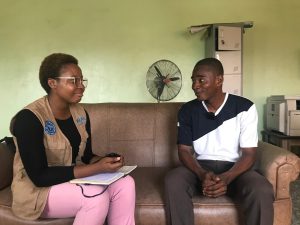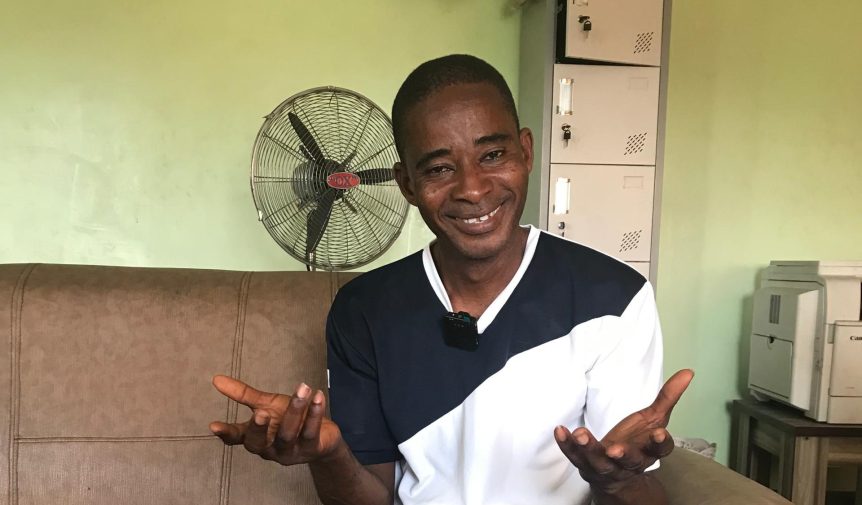James Temidayo has always been passionate about his community, even before his involvement with DRASA. As an employee of the Lagos State Waste Management Authority (LAWMA), he contributes to community progress by ensuring a cleaner and safer environment through proper waste management and disposal.
The knowledge he gained from DRASA’s SCKaR-IDP project enhanced his ability to serve his community. During a cholera outbreak, he diligently observed his surroundings and identified a leaking septic tank from an infected household, which could have endangered the lives of some residents in the Ayetoro ward of the Ajeromi-Ifelodun Local Government Area.
His story illustrates how one person's vigilance can make a significant impact and change the course of events in a community.
What are some of the new skills or things you learned?
I have been able to learn the importance of creating awareness when or where there are diseases, and I have also learned the style we can use on how to help the people surrounding us and also learned how I can personally, as an informant and as a human being how I can take care of myself so I will not infect my family. Most importantly, I have also learned how I can work to help my fellow people in the community when I see that some people are being infected with some diseases, so that I can prevent them.
How confident do you feel now about teaching others how to prevent the spread of diseases?
I can categorically say that I am very much confident about it. I am very confident about it because personally, when they were enlightening us on those diseases, I took my time to pay close attention so that I get acquainted with those things and since I have learned about it, I can easily tell the people close to me how they can protect themselves from those diseases. So I am very confident because I know something about it, and I can now pass the information on to other people.
Can you share a specific example of something you did in your community to spread the word about staying healthy after you became a Health Champion?
I can give an example of the cholera disease we just experienced about a month ago. When I remembered what we were taught, the first thing I did was to go to a hospital close to me where patients were brought in. The first thing I did was advise my family and community members that whenever they are going to that area, they should ensure that they practice proper hand washing. I specifically gave the responsibility to my wife to ensure that when the children are back from school, they wash their hands before any other thing. I also went around my neighbourhood to ensure that their septic tanks were not leaking. There was a compound where I found that the septic tanks were leaking, and already, two siblings had been confirmed to have contracted cholera. I immediately ensured that everyone in the compound was evacuated and that the compound was closed until the leaking septic tank issue was resolved. This action helped to prevent further spread to other compounds in the street. So what I have learned so far has helped me, and I have also passed it to my family as well as my neighbours.
What changes have you noticed around you since you started sharing what you learned?
The change I have observed is that whenever they find out that somebody close to them or somebody in their compound is having some symptoms, the first thing they do is to make reports. Sometimes they even call me, and sometimes I give them the number of our DSNO so that they can call themselves. In fact, all of them are really watching themselves, and people are now very conscious of what they eat, how they keep their surroundings, and even the practice of regular handwashing is now very rampant in our area.
What challenges have you faced while using what you learned in the community, and how did you handle these challenges that made reception easier?
There was a time I was entering a compound and somebody shouted, “e bi n pawa, kinikan leyin pariwo! Tani o kin ku?” (There is hunger in the land; you are there shouting about diseases! It is normal for people to die). But when they saw people suffer from diseases, they understood that the thing “no be sere sere” (It’s not child’s play). So right from that time, everybody became calm. Though when I was challenged by them, I took it calmly. I am not the country, nor am I the situation of the country. The people who listened to me did, and even later on, that person who said that before later became my friend, because when he saw that people had died, he understood that it was not to be taken for granted. My patience with him made him come back, and I was able to enlighten him more, and this guy is even part of the people now advising people not to do this and that.
In the future, what role would you like to play in keeping your community safe, and what would you like to see differently in your community when it comes to staying healthy?
I will continue to enlighten them and also make reports whenever I see a case. The changes I will want are to ensure that my environment is clean and that everybody is aware and conscious of any infectious diseases so that they will not catch it over there and come and affect people in my surroundings.

The health of one man is the health of all. The dedication of Health Champions involved in the Strengthening Community Knowledge and Response on Infectious Disease Prevention (SCKaR-IDP) project exemplifies this truth. Even in the face of adversity, they stay committed to the positive impact of their actions.




